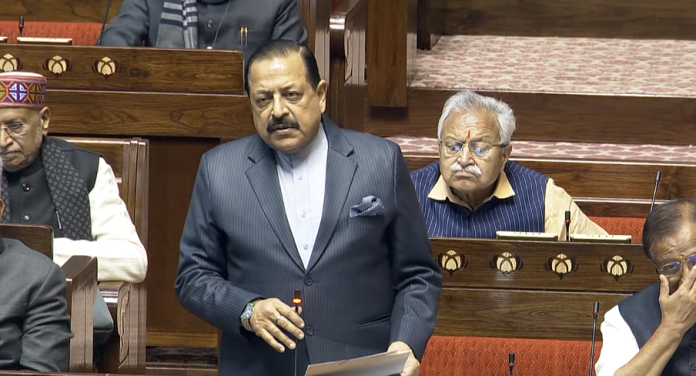NEW DELHI, Feb 8 : Union Minister of State (Independent Charge) Science & Technology; MoS PMO, Personnel, Public Grievances, Pensions, Atomic Energy and Space, shared with Rajya Sabha today several government initiatives to boost Space StartUps.
The Minister said, Indian Space Policy 2023 has been released by the Government of India, where roles and responsibilities of all the stakeholders contributing to the overall Indian space ecosystems are defined.
In reply to a question, Dr Jitendra Singh enumerated various schemes to encourage and hand hold private sector also announced and implemented by IN-SPACe, i.e., Seed Fund Scheme, Pricing Support Policy, Mentorship support, Design Lab for NGEs, Skill Development in Space Sector, ISRO facility utilization support, Technology Transfer to NGEs and Frequent meet/roundtable with the national and international industries for potential business opportunities.
IN-SPACe has signed around 51 MoUs with Non-Government Entities (NGEs) to provide necessary support for realization of space systems and applications envisaged by such NGEs, which is expected to increase the industry participation in manufacturing of launch vehicles and satellites.
Total number of registered start-ups on Digital Platform are approximately 189, he informed.
As of now, ISRO has no plans for Deep Space Probes, stated Dr Jitendra Singh. However, conceptualization studies are underway for advanced space exploration missions, such as continuation of human spaceflight program, further follow-up missions to the Moon and the Bhartiya Antriksh Station, he added.
The “Make in India” initiative in space technology is a strategic approach to boost domestic manufacturing, innovation, and self-reliance in the space sector. The self-reliance in space technology caters to both the upstream and downstream sector.
The Indian space program, with substantial contribution from domestic industries, has touched several new highs over the past 5 years, showcasing indigenous capabilities across all segments of space activities. Key achievements include commercial launches of LVM3 & PSLV, development of SSLV, earth observation satellites, navigation satellite, soft landing & roving on the Moon, mission to study the Sun (Aditya-L1) and major strides towards demonstration of human space flight.
Following are some of the major highlights of Make in India initiative and outcome contained in the Minister’s reply.
Domestic Manufacturing of Space hardware: Critical technologies and industrial ecosystems are being developed at ISRO as well as through IN-SPACe respectively.
Space system and satellite manufacturing facilities are being established by Indian NGEs.
Launch Vehicles systems realisation facilities are being set up by NGEs.
Dr Jitendra Singh informed that Indian Space Research Organisation (ISRO) is already working with the space agency of USA (NASA) for realising a joint satellite mission, named ‘NISAR (NASA ISRO Synthetic Aperture Radar)’ which is in the advanced stages of realisation. ISRO is working with CNES (French National Space Agency) for realising a joint satellite mission named ‘TRISHNA (Thermal Infrared Imaging Satellite for High Resolution Natural Resource Assessment)’, which is in the initial stages. ISRO and JAXA (Japan Aerospace Exploration Agency) have carried out a feasibility study to realise a joint lunar polar exploration mission.
Indian Space Policy – 2023 has been released, which provides the freedom of innovation to the private sector to pursue end-to-end activities in the space domain. Further, the India National Space Promotion and Authorisation Centre (IN-SPACe) has been functioning as a single-window agency to promote, authorise and encourage private sector participation in the Space sector.
ISRO pursues international collaboration with the objectives of enhancing the capacity of the Indian space programme for advancing programmatic priorities, augmenting space science and earth observation data base, widening ground station networks, bettering products and services through joint experiments and creating platforms for inflow of expertise.
Trending Now
E-Paper


